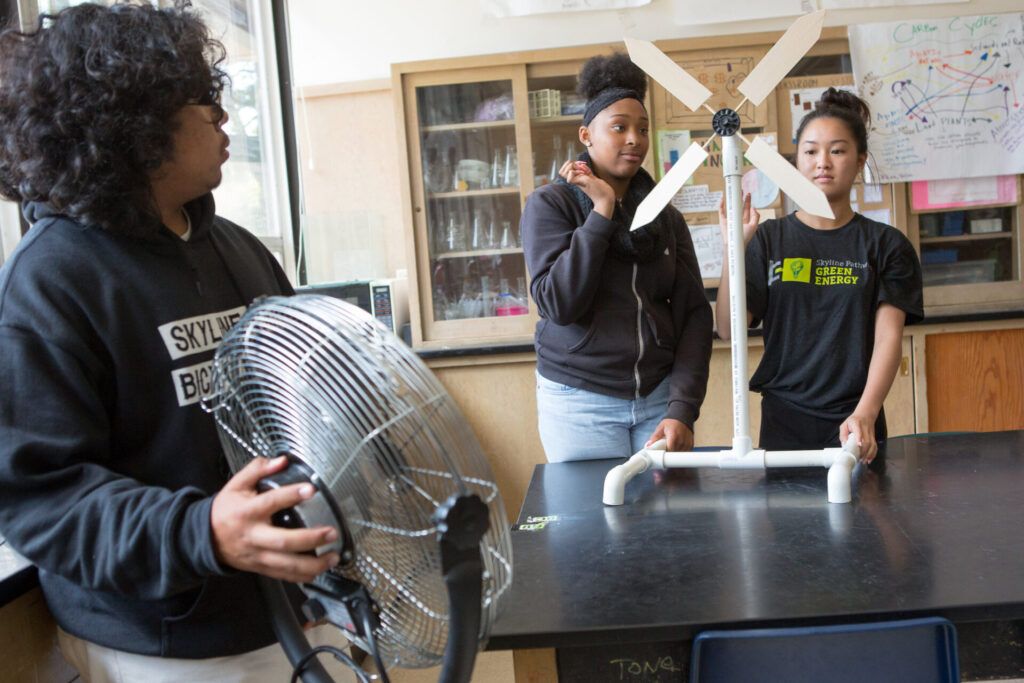Climate change education can survive four more years of climate change denial
By Glenn Branch | February 18, 2025
 The federal government lacks substantial influence over what is taught in the public schools. Education is in the hands of 13,500-odd local school districts, under the guidance of the individual states—mainly through state standards, which specify what knowledge and know-how students are expected to acquire in the course of their education. Photo: Allison Shelley/The Verbatim Agency for EDUimages/Flickr
The federal government lacks substantial influence over what is taught in the public schools. Education is in the hands of 13,500-odd local school districts, under the guidance of the individual states—mainly through state standards, which specify what knowledge and know-how students are expected to acquire in the course of their education. Photo: Allison Shelley/The Verbatim Agency for EDUimages/Flickr
Climate change denial is apparently going to be ensconced in the White House for the next four years. Donald Trump, the denier-in-chief, is notoriously on record as having repeatedly called global warming a hoax. Likewise, the bulk of his cabinet picks and advisers reportedly reject or ignore the scientific consensus that the planet is warming at a dangerous and unprecedented rate owing to human activities, particularly the burning of fossil fuels.
Perhaps surprisingly, however, the consequences for climate change education in the United States are likely to be minimal. That’s simply because the federal government lacks substantial influence over what is taught in the public schools. Education is in the hands of 13,500-odd local school districts, under the guidance of the individual states—mainly through state standards, which specify what knowledge and know-how students are expected to acquire in the course of their education.
To be sure, climate change is not always presented adequately in state science standards. In a 2020 study conducted by the National Center for Science Education and the Texas Freedom Network Education Fund, only 26 states (plus the District of Columbia) received a grade of B+ or better for the treatment of climate change in their state science standards. Six states—Alabama, Georgia, Pennsylvania, South Carolina, Texas, and Virginia—received a failing grade.
However, there are signs of improvement as states periodically revise their state science standards. Thanks to such revisions, Pennsylvania and South Carolina would now no longer receive a failing grade, while Indiana was catapulted from a D into B+ or A- territory. Admittedly, there is deterioration, too. By removing the only reference to the human causes of rising temperatures from its standards in 2023, Alabama took a step backward. But the general trend is toward improvement.
The treatment of climate change in state science standards matters. For example, a 2024 study conducted by researchers from the National Center for Science Education and Penn State found that public middle school science educators were significantly more likely to teach about recent global warming and to devote more class time to the topic in 2019 than in 2014. These improvements were partly the result of changes to state science standards over just five years.
But states must do more than just improve the treatment of climate change in their state science standards. They also have to provide science teachers with professional development and instructional resources to enable them to meet the increased demands of the new standards. The legislatures of four states—California, Maine, New Jersey, and Washington—have specifically appropriated funds to do so, and similar bills have been introduced elsewhere, so far unsuccessfully.
These bills are only part of a groundswell of state legislation seeking to support climate change education. Between 2000 and 2024, no fewer than 90 such measures were introduced in 21 states across the country, with noteworthy successes in California, Colorado, Connecticut, and Illinois. There is no sign of interest abating, with state legislators in Hawaii, Minnesota, New York, and Oregon already proposing a total of eight bills in those states in 2025.
Yet there are clouds on the horizon for climate change education. Climate change deniers are sure to exploit their new bully pulpit in the White House, attempting to use the powers of the federal government to undermine climate change education indirectly. A particular concern is the prospect of the peremptory removal of reliable scientific information about climate change aimed at public school science educators provided by federal agencies such as NASA, NOAA, and USGS.
Attempts to undermine climate change education at the state and local level are likely to continue as well. Recent examples include a 2023 decision by the Texas state board of education to deny state approval to science textbooks on account of their treatment of climate change and a 2024 demand from the Florida state department of education that publishers remove material on climate change from their science textbooks to obtain state approval. Doubtless more such moves are in the offing.
Today’s students will inherit a hotter world. It will take the vigilance and the efforts of everyone concerned about their future to ensure that climate change education withstands four more years of denial in the White House. Encouragingly, surveys routinely show that a majority of Americans agree that schools should teach about the causes, consequences, and potential solutions to global warming. If that mandate can be mobilized, climate change education might not only survive, but even thrive.
Together, we make the world safer.
The Bulletin elevates expert voices above the noise. But as an independent nonprofit organization, our operations depend on the support of readers like you. Help us continue to deliver quality journalism that holds leaders accountable. Your support of our work at any level is important. In return, we promise our coverage will be understandable, influential, vigilant, solution-oriented, and fair-minded. Together we can make a difference.
Keywords: Trump administration, climate change, education, politics and science, state governments
Topics: Climate Change
















A good resource for education is this lecture at the Long Now Foundation –
https://longnow.org/seminars/02018/jan/22/wizard-and-prophet/
and the book –
https://www.kirkusreviews.com/book-reviews/charles-c-mann/the-wizard-and-the-prophet/
If a resource is on the web you really can’t keep people from using it.